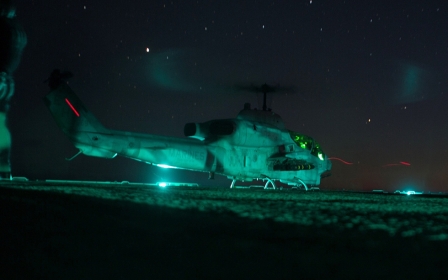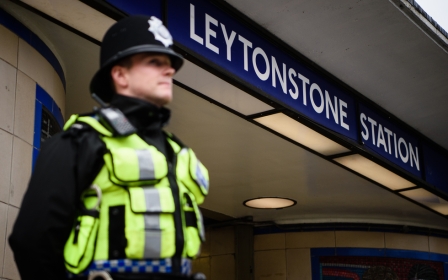US police officer charged with aiding Islamic State group

A Washington, DC transit police officer was arrested on Wednesday on charges he attempted to help the Islamic State (IS) group, the US Justice Department said, the first member of law enforcement facing such charges involving a government-designated terrorist group.
The suspect, Nicholas Young, 36, of Fairfax, Virginia, allegedly sent codes for gift cards worth $245 to an FBI informant in July. The cards were intended for mobile-messaging accounts that IS uses to recruit its followers, according to court records.
"Metro Transit Police alerted the FBI about this individual and then worked with our federal partners throughout the investigation up to and including today's arrest," Washington Metropolitan Area Transit Authority General Manager and CEO Paul Wiedefeld said.
"Obviously, the allegations in this case are profoundly disturbing. They're disturbing to me, and they're disturbing to everyone who wears the uniform," he said in a statement.
Young believed the informant was an acquaintance who was working with the militant group, the documents said.
Young, an officer with the Washington Metropolitan Area Transit Authority since 2003, had been on the radar of federal law enforcement since 2010, according to an affidavit filed in U.S. District Court in Virginia.
Metro authorities said Young was fired after his arrest on Wednesday.
According to court records, he did not have a lawyer as of Wednesday afternoon.
Young is the first law enforcement officer charged with attempting to provide material support to a designated terrorist organisation, according to the FBI.
The Justice Department has brought Islamic State-related charges against more than 90 people since 2014.
Young did not pose a threat to Metro riders or employees during the six years he was under federal surveillance, said Joshua Stueve, a spokesman for the Eastern Virginia U.S. Attorney's Office.
In 2014, he met several times with an undercover FBI agent who was posing as an eager recruit of IS, according to the affidavit. He advised the agent about how to evade law enforcement as he left the US to join the militant group.
Young sent the gift card codes after the informant told him that the group needed help setting up mobile messaging accounts, according to the affidavit. He then promised to cover his tracks: "Gonna eat the SIM card. Have a good day."
Metro General Manager Paul Wiedefeld called the charges "profoundly disturbing". In a statement, he said transit police alerted the FBI about Young and cooperated with federal agents during the investigation.
According to the Justice Department, Young traveled to Libya in 2011 and tried to go a second time.
Baggage searches at the time found that Young was traveling with military equipment such as body armor. He told authorities he had been with rebels attempting to overthrow dictator Muammar Gaddafi.
That same year, Young met several times with an undercover agent while accompanied by Amine El Khalifi, an acquaintance. El Khalifi later pleaded guilty to charges related to his plan to carry out a suicide bomb attack on the US Capitol Building.
If convicted, Young faces a maximum sentence of 20 years in prison.
Seamus Hughes, an expert on US extremism at George Washington University in Washington, called the case against Young typical of those brought against homegrown extremists since it involved an informant.
The rise of IS "seems to have pushed him from just radical to mobilized to action," he said.
New MEE newsletter: Jerusalem Dispatch
Sign up to get the latest insights and analysis on Israel-Palestine, alongside Turkey Unpacked and other MEE newsletters
Middle East Eye delivers independent and unrivalled coverage and analysis of the Middle East, North Africa and beyond. To learn more about republishing this content and the associated fees, please fill out this form. More about MEE can be found here.




